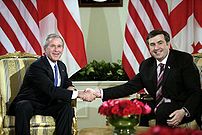
Image via Wikipedia
Bush/Cheney and the US press would have us believe we have a new cold war with Russia. It's clear Russia seems to think. Russia reacted perhaps disproportionally to Georgia's military attack on it's rebellious provinces, Russia asked for National Security Council call for a cease fire, but for unknown reasons, they were rebuffed. Russia's response was predictable, even planned as a fall back position should this series of events happen. Putin had every reason to expect it would. He'd been clearly indicating for weeks that a military response was on the table should Georgia intervene. Georgia's President Saakashvilli stupidly did so, and Russia responded as it expected it would. Learning from the Israeli's, Russia's disproportional response was designed to be absolutely sure that Georgia would never act militarily again. Their "peacekeeping" buffer zone is also straight from the Israeli playbook. Even Putin and Medvedev's language has been similar.
International Herald Tribune
President George W. Bush and Vice President Dick Cheney all along wanted to offer Georgia early NATO membership, not calculating the practical reality that NATO would be obliged to come to Georgia's defense under the NATO Charter.
It was always on the cards that the Georgian president, Mikheil Saakashvili, would decide - as he did - to "restore constitutional order" to the separatist province of South Ossetia. Had Georgia been a member of NATO on Aug. 7, when Georgia launched missiles and tanks against South Ossetia, NATO would have suffered a devastating blow had it not responded to Russia's counterattack.
President Nicolas Sarkozy was right not to commit either NATO or the EU to restoring the territorial integrity of Georgia as part of the EU cease-fire initiative.
In the Western democracies, our politicians and press now talk only of the Russian invasion and ignore the Georgian military attack. To liken South Ossetia to the Soviet Union's military action in Hungary in 1956 or Czechoslovakia in 1968 is neither serious history nor realistic politics.
There are sound reasons why NATO membership cannot be handed out to any country that asks. A would-be member's democracy first has to be proven, and its foreign policy must be stable and aligned with that of the other member states. And wherever possible, the national boundaries of a new member should be accepted by its neighbors.
For some years it has been clear that the wise course has been to put EU membership for Georgia and Ukraine ahead of their membership in NATO. The first lesson from the fighting in Georgia is to speed up EU membership for both, and not to advance NATO membership so long as boundary disputes remain.
The other key lesson is to make EU membership for Turkey a priority. Turkey is the one country which can help the EU seriously diversify its gas and oil supply. Turkey, along its entire length, can and should have a gas and oil pipeline to supply Europe - not just from the Caspian Sea and the countries surrounding it, but eventually from Iraq and Iran as well.
Turkey must be a partner in this EU energy enterprise and it will be far more committed to the project when it sees that objections to its EU entry from France and to a lesser extent Germany have been put to rest and that there is a reliable timetable for entry into the Union.
This is not an anti-Russian proposal. Diversity of energy is a national interest for Russia as well as European nations - a diversity of customers for Russia, a diversity of suppliers for Europe.
David Owen, chancellor of the University of Liverpool, was Britain's foreign secretary in 1977-79 and a European Union peace negotiator in the former Yugoslavia 1992-95. This article was adapted from Lord Owen's address to the M100 Sanssouci Colloquium in Potsdam, Germany.
Related articles by Zemanta
- Cheney Blasts "Illegitimate" Russian Moves
- Cheney in ex-Soviet energy call
- Bush Pledges $1 Billion to Georgia

![Reblog this post [with Zemanta]](http://img.zemanta.com/reblog_e.png?x-id=db935201-5b73-4015-b6c0-569370bf688b)

No comments:
Post a Comment